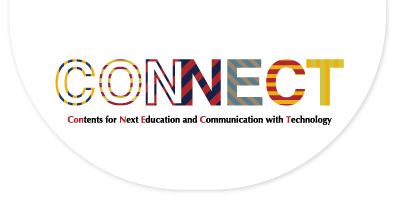TopicsSession Report
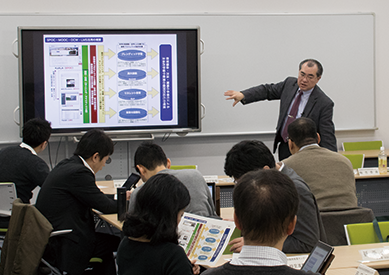
On-Campus Workshop
"Thinking about ICT Use for Educational/Learning Assistance Tailored to Department, Faculty, and Student Needs"
Published online: April 23, 2018
On March 8, 2018, the workshop "Thinking about ICT Use for Educational/Learning Assistance Tailored to Department, Faculty, and Student Needs" was held for Kyoto University faculty and staff (Organizer: Committee for the Promotion of Educational Content Utilization, Center for the Promotion of Excellence in Higher Education).
In academic year 2017, Kyoto University built KoALA, which provides a small private online course (SPOC) environment. Since academic year 2014, the university made its massive open online courses (MOOC) available to the public on a global scale under the KyotoUx brand. Since its commencement of services, the OpenCourseWare (OCW) has operated for 15 years and increased the number of content to more than 700. The learning management system (LMS) called PandA has been operating at Kyoto University since academic year 2012.
These are educational ICT tools and platforms operated and managed by Kyoto University. How is it possible to practically use them to provide educational and learning support? What challenges will be encountered during tool and platform introduction? Twenty-three faculty and staff members from 13 departments of Kyoto University discussed these matters.
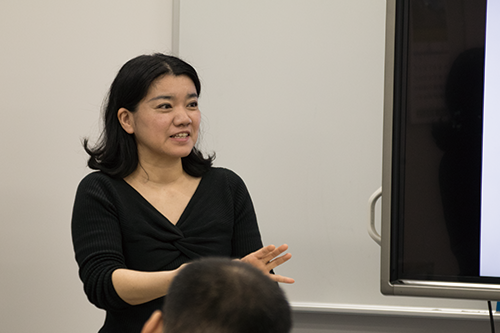
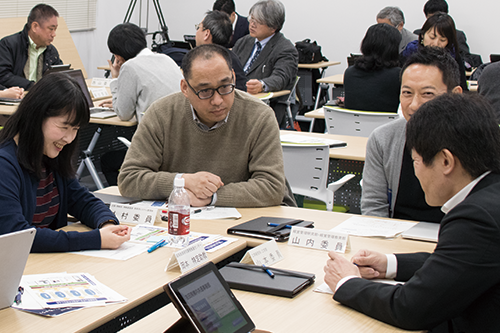
Left: Associate Professor Taguchi, Center for the Promotion of Excellence in Higher Education, moderated the workshop.
Right: Group work participants smiling on occasion.
Program
Thursday, March 8, 2018 in Room 201, Yoshida-South Building No. 1
Moderator: Mana Taguchi (Associate Professor, Center for the Promotion of Excellence in Higher Education)
Topic 1
11:45-11:50 "Overview of the Use of SPOC, MOOC, OCW, and LMS at Kyoto University"
Toru Iiyoshi (Professor/Director, Center for the Promotion of Excellence in Higher Education)
Topic 2
1:50-12:05 "Example Uses of Educational Content on Campus: Focus on SPOC"
Hiroyuki Sakai (Associate Professor, Center for the Promotion of Excellence in Higher Education)
Group Work
12:05-12:45 "Thinking about ICT Use for Educational/Learning Assistance Tailored to Department, Faculty, and Student Needs"
Topic 1
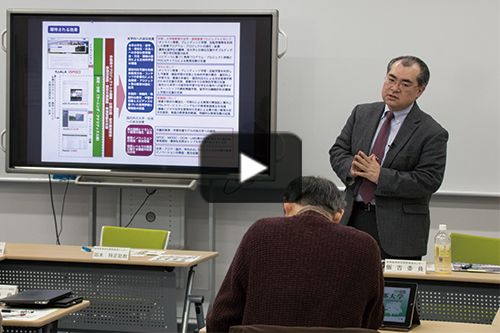
Professor Iiyoshi, Director of the Center for the Promotion of Excellence in Higher Education presents his topic. [Click image to view video. Only in Japanese (KU members only).]
The workshop started with addressing the usage of SPOC, MOOC, OCW, and LMS, presented by Professor Iiyoshi, Director of the Center for the Promotion of Excellence in Higher Education.
He first reported what platforms have been provided on campus for ICT-enhanced teaching and learning. He then talked about the possible use of ICT for articulation between high school and university, in combination with recurrent education, for educational support of foreign students, and in preliminary learning, as well as for supplementary purposes within the existing lecture framework.
Moreover, Professor Iiyoshi presented prospects for ICT use not only for class- or course-level blended learning, but also, as a global trend, for potential blended operations in credit system and degree programs.
Click here to view explanatory handout used in workshop. Only in Japanese (KU members only).
Topic 2
Next, Associate Professor Sakai explained examples of the usage of educational content on campus. He presented examples of how instructors who provided MOOC via KyotoUx were using MOOC. He then summarized features of and differences between SPOC (including KoALA), MOOC, OCW, and PandA, which is Kyoto University's LMS.
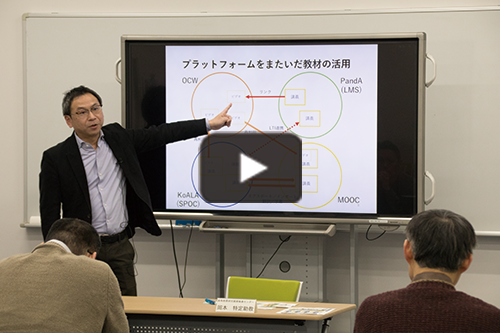
Associate Professor Sakai at the Center for the Promotion of Excellence in Higher Education presents his topic. [Click image to view video. Only in Japanese (KU members only).]
In his summary, Associate Professor Sakai explained the real-time learning log analysis function of KoALA and the possibility of partial provisioning of instructional material, in which KoALA differs from MOOC. He also talked about the possibility of cross-platform use of instructional material between MOOC and KoALA, or PandA and KoALA.
Furthermore, he reported on idea of MicroMasters, which bundles several MOOCs into an educational program that enables taking and completing each MOOC as a requirement for completing graduate education. He also described specific use of courses made open or planned to be made open to the public by KoALA.
Click here to view explanatory handout used in workshop. Only in Japanese (KU members only).
Group Work
At first, the participants in the group work discussed the following questions:
- "What educational challenges facing each department can be solved by using ICT?"
- "What might be the hurdle to be cleared if the challenges would be solved?"
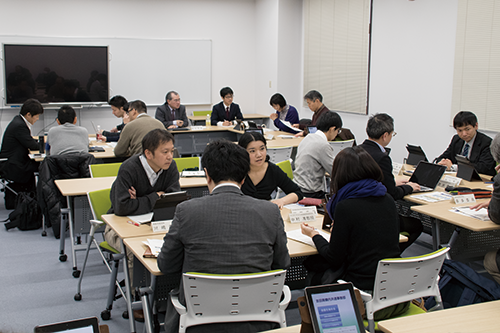
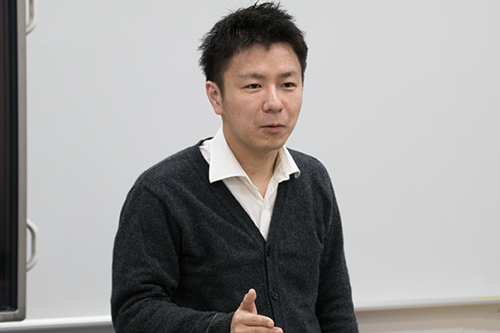
Left: General view of the workshop. The participants formed four groups for discussion.
Right: Each group's representative reported on their discussions.
- Excerpts from opinions expressed in group work
-
-
About MOOC
- Watching the process of recording videos and creating captions, I sense substantial inhibitions in the introduction of MOOC. If the advantages are unclear, use of MOOC may not become popular.
- (In response to the above view) One actual example of MOOC usage is as instructional material for the flipped classroom approach.
- From the perspective increasing its popularity, international students often take MOOC with the aim of preparing for admission exams to graduate school and for classes. As such, it is a challenge to make MOOC popular among Japanese students. What about conducting a survey?
- KoALA looks less production-related inhibitions than MOOC. One issue is that when recording in my room, the process can be interrupted due to sporadic noise. it is convenient to use studio and equipment. Another challenge is that discussions occasionally are not encouraged.
- (In response to the above view) Regarding rental studios, I remember that there is a convenient space for use in a campus building. Regarding editing and setup methods, a technical manual should be in place for convenience. And to encourage discussions, it is effective to link it to grading. Moreover, for students to understand the value of discussions, the instructor should guide them appropriately.
- Given the handiness of KoALA, it is worthwhile to encourage students to produce KoALA courses as part of their education.
- From the point of view of the faculty which offers almost all of classes in English, it may be effective for Japanese students to use KoALA desgined as instructional material for preparation and review.
- It is worthwhile to use KoALA in connection with entrance exams for prospective students and with recommendation for admission. This is also true for MOOC.
- High school students watch Kyoto University's OCW with keen interest. There may be a high level of need for OCW among high school students.
- (In the case of a participant) I rarely use ICT in my lectures due to faculty related reasons. However, I'd like to continue turning open campus programs to OCW.
- Currently, I vigorously use PandA because it enables users to upload a large amount of data, such as research reports and to check whether assignments have been submitted or not. Another advantage of PandA is that it enables users to immediately share notices and requests.
- When there are many students, I occasionally think that it is a demanding task that requires a lot of labor to process replies and feedback.
- (In response to the above view) Currently, testing is underway for a new technique designed to make processing replies and feedback easy. Could you wait for some time to see it become easier?
- Preparing educational content from scratch is a laborious task. It may be a good idea to use content available from outside. Is there any good way to do this?
- It is not allowed to use outside content in KoALA due to copyright issues. However, PandA can provide links to guide users to relevant content.
About KoALA (SPOC)
About OCW
About PandA
Other
